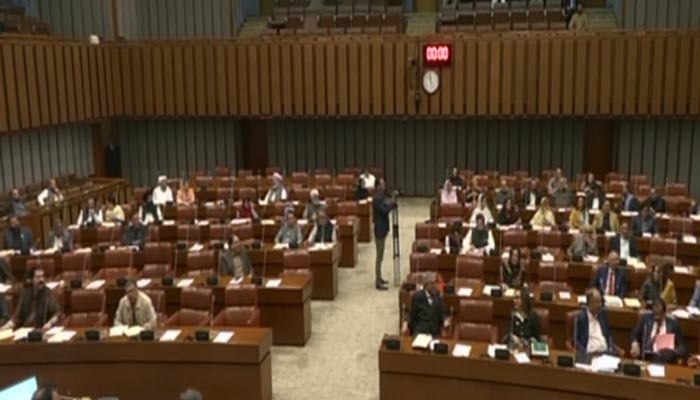
A screengrab of Senate session taken from the live stream. — YouTube@SenateofPakistan
#Senate #nod #military #bills #align #laws #27th #Amendment
The Senate approved four bills on Friday, three on the armed forces, a day after the National Assembly passed them with a majority vote.
On Thursday, the Lower House passed bills to align the Laws Governing the Armed Forces and Supreme Court (Practice and Procedure) Act, 2023 with the 27th Amendment to the Constitution.
The Supreme Court (Practice and Procedure) Bill, 2025, the Pakistan Army (Amendment) Bill, 2025, the Pakistan Navy (Amendment) Bill, 2025 and the Pakistan Air Force (Amendment) Bill, 2025 were passed after introducing the same supplementary agenda.
The Bills redefined institutional roles and brought several laws in line with the 27th Constitutional Amendment.
Central to these changes is the newly created Office of the Chief of Defense Forces (CDF) under the five-year tenure of Chief of the Army Staff (COAS), Field Marshal Asim Munir.
Speaking during the National Assembly session after Defense Minister Khawaja Asif presented the bill, Law Minister Aizaz Nazir Tarar said that the term of the CDF will start from the date of his appointment.
Under the amendments, COAs will simultaneously serve as Chief of Defense Forces for five years. The tenure of Field Marshal Munir will resume from the date of issue of the new notification.
The provisions of Article 243 applicable to a field marshal are also promoted to a general rank. The Federal Government may authorize the Deputy Chief of Army Staff or the Deputy Chief of Army Staff to exercise the powers of COAs under written orders issued on the recommendation of the CDF.
The legislation further specifies that once the first notification for dual office is issued, the tenure of existing COAs will be restarted from the date of such notification.
The federal government will determine the duties and responsibilities of the CDF, including multi-domain integration, restructuring and ensuring the commonality of the armed forces.
A major structural change approved in the bill is to eliminate the position of Chairman of the Joint Chiefs of Staff Committee (CJCSC), replacing it with the Commander of the National Strategic Command. The Prime Minister may, on the recommendation of the COAS/CDF, appoint a Commander from among the serving Pakistan Army Generals for a period of three years.
The terms and conditions of appointment shall be prescribed by the Prime Minister, who may also grant an extension of three years in the interest of national security. The bill states that any appointment, re-appointment or extension for a commander shall not be challenged before any court.
The Pakistan Air Force (Amendment) Bill, 2025 removed Sections 10D, 10E and 10F of the Pakistan Air Force Act, 1953, which earlier dealt with the appointment, tenure, extension and retirement of the PAF Chief as CJCSC. All references to the CJCSC are omitted in the Act. Similarly, the Pakistan Navy (Amendment) Bill, 2025 deleted Sections 14D, 14E and 14F relating to the appointment and tenure of the Chief of the Navy, and also removed the term from other provisions of the Act.
The Supreme Court (Practice and Procedure) Bill
The Lower House also passed the Supreme Court (Practice and Procedure) Bill, 2025 which provides that every application, appeal or review petition before the Supreme Court shall be heard and disposed of by a committee consisting of the Chief Justice, the next most senior judge and the judge to be nominated by the Chief Justice.
It also states that if a member is unable to attend the meeting of the committee for any reason, the Chief Justice may nominate another judge. The Bill also omits the sections containing the words “Constitution Benches” in the Supreme Court (Practice and Procedure) Act, 2023 (XVII of 2023).
Earlier, a federal cabinet meeting chaired by Prime Minister Shehbaz Sharif approved amendments to the Pakistan Army, Air Force and Navy Act.
The purpose of these changes is to align the defense legislation with Article 243. The Cabinet also approved the creation of the office of Chief of Defense Forces and eventual abolition of the post of CJCSC after his impending retirement. In addition to these amendments, the honorary ranks of Field Marshal, Marshal of the Air Force and Admiral of the Fleet are also introduced to reflect the contemporary military structure.
The Cabinet further approved the draft of the Federal Constitutional Court (Procedure and Practice) Act, 2025, which aims to define the procedures of the proposed judicial body.




